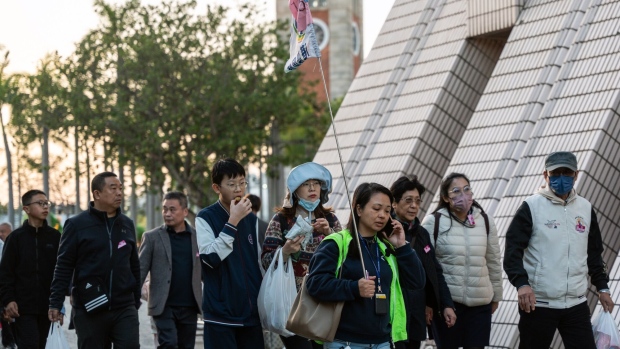Feb 18, 2024
Hong Kong Records Most Chinese New Year Tourists Since Pre-Covid
, Bloomberg News

(Bloomberg) -- Chinese tourists tapped a lengthy national holiday to travel to Hong Kong, Macau and overseas in the largest numbers they have in years, suggesting consumption in the world’s second-largest economy is mounting a rebound.
More than 1.2 million Chinese travelers visited Hong Kong during the eight-day Lunar New Year festival, the financial hub’s government said Sunday. That surpassed the number recorded over an equivalent period in 2018, before the pandemic. Nearby Macau reported a record 1.4 million tourists for the holiday — an upbeat sign for casinos in the world’s biggest gambling hub.
Chinese visitors to Hong Kong were down slightly compared to 2019, when some 1.4 million tourist trips were made to the city, according to government data. The holiday lasted seven days that year.
The new year holiday — which this year was also one day longer than in 2023 — marks China’s most important national celebration and is a key barometer for consumption early in the year. China’s outbound travel has been recovering more slowly than domestic travel as the ongoing property crisis dents confidence and deflationary pressures persist. During last year’s national holidays, budget-conscious consumers still took trips but sought out cheaper deals and spent less.
Markets were mixed in Monday trading after the data. China’s onshore benchmark CSI 300 Index closed up 1.2%. A gauge tracking Macau casino operators fell 2%, paring even worse losses of as much as 3.4%.
Overseas tourism appeared to start picking up this year. Shanghai’s Pudong and Hongqiao airports handled about 860,000 inbound and outbound passengers over the holiday period, more than five times above last year’s figure, the official Xinhua News Agency reported.
About 29,000 people either coming from or headed to Singapore traveled through Pudong airport, some 12 times more than over a comparable time frame in 2023. The two nations reached a visa-free arrangement that kicked off earlier this month allowing Chinese and Singaporeans to stay in the other country for up to 30 days without a travel permit.
“I think the relaxing of visa really takes away a lot of friction,” Lim Ching Kiat, executive vice president for air hub and cargo development at Singapore’s Changi Airport, said in an interview with Bloomberg News. “Our recovery rate between Singapore and China market is actually quite healthy.”
Coming soon: Sign up for Hong Kong Edition to get an insider’s guide to the money and people shaking up the Asian finance hub.
Spending overseas has been positive, too, with Chinese tourists shelling out 70% more on food and beverages compared to 2019, according to data last week from fintech giant Ant Group. Among the top destinations for Chinese travelers were Hong Kong, Japan, Thailand, France and Australia.
--With assistance from Danny Lee, Jinshan Hong, Zhu Lin and Charlotte Yang.
(Updates with market reaction, additional historical data.)
©2024 Bloomberg L.P.


